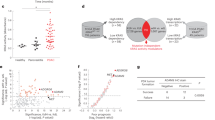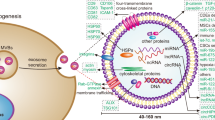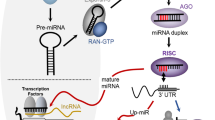Abstract
Invasion and metastasis are the major features of malignant tumors that are responsible for 90% of cancer-related deaths. Recently, microRNAs have been discovered to have a role in suppressing tumor metastasis. This study's aim was to clarify the roles of miR-145 in gastric carcinomas and its underlying molecular mechanism in regulating tumor metastasis. Here, we demonstrate a stepwise downregulation of miR-145 level in nontumorous gastric mucosa, primary gastric cancers and their secondary metastases. In vitro analysis of miR-145's ectopic expression and loss-of-function suggests that it suppresses gastric cancer cell migration and invasion. In vivo spontaneous metastasis and experimental metastasis assay further confirm its function in suppressing the invasion–metastasis cascade, including impairing local invasion and inhibiting hematogenous metastasis in gastric cancers. Furthermore, we identified a novel mechanism of miR-145 to suppress metastasis. N-cadherin (CDH2) was proved to be a direct target of miR-145, using luciferase assay and western blot. Re-expressing N-cadherin in miR-145-transfected cells reverses their migration and invasion defects. Although not a direct target of miR-145, matrix metallopeptidase 9 (MMP9), but not MMP2, was also significantly decreased in miR-145-expressing cells. We suggest that miR-145 suppresses tumor metastasis by inhibiting N-cadherin protein translation, and then indirectly downregulates its downstream effector MMP9.
This is a preview of subscription content, access via your institution
Access options
Subscribe to this journal
Receive 50 print issues and online access
$259.00 per year
only $5.18 per issue
Buy this article
- Purchase on Springer Link
- Instant access to full article PDF
Prices may be subject to local taxes which are calculated during checkout







Similar content being viewed by others
References
Gupta GP, Massagué J . Cancer metastasis: building a framework. Cell 2006; 127: 679–695.
Coghlin C, Murray GI . Current and emerging concepts in tumour metastasis. J Pathol 2010; 222: 1–15.
Farazi TA, Spitzer JI, Morozov P, Tuschl T . miRNAs in human cancer. J Pathol 2011; 223: 102–115.
Calin GA, Croce CM . MicroRNA signatures in human cancers. Nat Rev Cancer 2006; 6: 857–866.
de Krijger I, Mekenkamp LJ, Punt CJ, Nagtegaal ID . MicroRNAs in colorectal cancer metastasis. J Pathol 2011; 224: 438–447.
Zhang H, Li Y, Lai M . The microRNA network and tumor metastasis. Oncogene 2010; 29: 937–948.
Ma L, Teruya-Feldstein J, Weinberg RA . Tumour invasion and metastasis initiated by microRNA-10b in breast cancer. Nature 2007; 449: 682–688.
Meng F, Henson R, Wehbe-Janek H, Ghoshal K, Jacob ST, Patel T . MicroRNA-21 regulates expression of the PTEN tumor suppressor gene in human hepatocellular cancer. Gastroenterology 2007; 133: 647–658.
Gabriely G, Wurdinger T, Kesari S, Esau CC, Burchard J, Linsley PS et al. MicroRNA 21 promotes glioma invasion by targeting matrix metalloproteinase regulators. Mol Cell Biol 2008; 28: 5369–5380.
Crawford M, Brawner E, Batte K, Yu L, Hunter MG, Otterson GA et al. MicroRNA-126 inhibits invasion in non-small cell lung carcinoma cell lines. Biochem Biophys Res Commun 2008; 373: 607–612.
Song G, Zhang Y, Wang L . MicroRNA-206 targets notch3, activates apoptosis, and inhibits tumor cell migration and focus formation. J Biol Chem 2009; 284: 31921–31927.
Sachdeva M, Mo YY . MicroRNA-145 suppresses cell invasion and metastasis by directly targeting mucin 1. Cancer Res 2010; 70: 378–387.
Schepeler T, Reinert JT, Ostenfeld MS, Christensen LL, Silahtaroglu AN, Dyrskjut L et al. Diagnostic and prognostic microRNAs in stage II colon cancer. Cancer Res 2008; 68: 6416–6424.
Ichimi T, Enokida H, Okuno Y, Kunimoto R, Chiyomaru T, Kawamoto K et al. Identification of novel microRNA targets based on microRNA signatures in bladder cancer. Int J Cancer 2009; 125: 345–352.
Shi B, Sepp-Lorenzino L, Prisco M, Linsley P, deAngelis T, Baserga R . Micro RNA 145 targets the insulin receptor substrate-1 and inhibits the growth of colon cancer cells. J Biol Chem 2007; 282: 32582–32590.
Valastyan S, Reinhardt F, Benaich N, Calogrias D, Szász AM, Wang ZC et al. A pleiotropically acting microRNA, miR-31, inhibits breast cancer metastasis. Cell 2009; 137: 1032–1046.
Takagi T, Iio A, Nakagawa Y, Naoe T, Tanigawa N, Akao Y . Decreased expression of microRNA-143 and -145 in human gastric cancers. Oncology 2009; 77: 12–21.
Desiderio MA . Hepatocyte growth factor in invasive growth of carcinomas. Cell Mol Life Sci 2007; 64: 1341–1354.
Gao CF, Vande Woude GF . HGF/SF-Met signaling in tumor progression. Cell Res 2005; 15: 49–51.
Hazan RB, Qiao R, Keren R, Badano I, Suyama K . Cadherin switch in tumor progression. Ann N Y Acad Sci 2004; 1014: 155–163.
Nicoloso MS, Spizzo R, Shimizu M, Rossi S, Calin GA . MicroRNAs—the micro steering wheel of tumour metastases. Nat Rev Cancer 2009; 9: 293–302.
Gao P, Chak-Lui Wong C, Kwok-Kwan Tung E, Man-Fong Lee J, Wong CM, Oi-Lin Ng I . Deregulation of microRNA expression occurs early and accumulates in early stages of HBV-associated multistep hepatocarcinogenesis. J Hepatol 2011; 54: 1177–1184.
Akao Y, Nakagawa Y, Kitade Y, Kinoshita T, Naoe T . Downregulation of microRNAs-143 and -145 in B-cell malignancies. Cancer Sci 2007; 98: 1914–1920.
Huang Q, Gumireddy K, Schrier M, le Sage C, Nagel R, Nair S et al. The microRNAs miR-373 and miR-520c promote tumour invasion and metastasis. Nat Cell Biol 2008; 10: 202–210.
Tanaka H, Kono E, Tran CP, Miyazaki H, Yamashiro J, Shimomura T et al. Monoclonal antibody targeting of N-cadherin inhibits prostate cancer growth, metastasis and castration resistance. Nat Med 2010; 16: 1414–1420.
Nakajima S, Doi R, Toyoda E, Tsuji S, Wada M, Koizumi M et al. N-cadherin expression and epithelial-mesenchymal transition in pancreatic carcinoma. Clin Cancer Res 2004; 10: 4125–4133.
Deryugina EI, Quigley JP . Matrix metalloproteinases and tumor metastasis. Cancer Metastasis Rev 2006; 25: 9–34.
Parmo-Cabauas M, Molina-Ortiz I, Matías-Román S, García-Bernal D, Carvajal-Vergara X, Valle I et al. Role of metalloproteinases MMP-9 and MT1-MMP in CXCL12-promoted myeloma cell invasion across basement membranes. J Pathol 2006; 208: 108–118.
Hulit J, Suyama K, Chung S, Keren R, Agiostratidou G, Shan W et al. N-cadherin signaling potentiates mammary tumor metastasis via enhanced extracellular signal-regulated kinase activation. Cancer Res 2007; 67: 3106–3116.
Hazan RB, Phillips GR, Qiao RF, Norton L, Aaronson SA . Exogenous expression of N-cadherin in breast cancer cells induces cell migration, invasion, and metastasis. J Cell Biol 2000; 148: 779–790.
Hartland SN, Murphy F, Aucott RL, Abergel A, Zhou X, Waung J et al. Active matrix metalloproteinase-2 promotes apoptosis of hepatic stellate cells via the cleavage of cellular N-cadherin. Liver Int 2009; 29: 966–978.
Sachdeva M, Zhu S, Wu F, Wu H, Walia V, Kumar S et al. p53 represses c-Myc through induction of the tumor suppressor miR-145. Proc Natl Acad Sci USA 2009; 106: 3207–3212.
Acknowledgements
This work was supported by the National Natural Science Foundation of China (No. 30972929, 81172351) and the Natural Science Foundation of Shandong Province of China (No. ZR2010HM075). We thank Chun-Ming Wong and Irene Oi-Lin Ng of Department of Pathology, Li Ka Shing Faculty Medicine, University of Hong Kong for useful advice and discussion. Peng Gao was a Cheng Yu Tung Fellow at the University of Hong Kong. The study was approved by the Ethics Committee of Shandong University.
Author contributions: Conception and design: Peng Gao. Collection and assembly of the data: Peng Gao, Ai-Yan Xing, Chao Gao, Duan-Bo Shi and Jian-Ping Zhang. Data analysis and interpretation: Peng Gao, Ai-Yan Xing, Geng-Yin Zhou and Ting-Guo Zhang. Manuscript writing: Peng Gao, Ai-Yan Xing, Geng-Yin Zhou and Shun-Li Zhang. Final approval of the manuscript: Peng Gao, Ai-Yan Xing, Geng-Yin Zhou, Ting-Guo Zhang, Chao Gao, Hong Li, Duan-Bo Shi and Jian-Ping Zhang.
Author information
Authors and Affiliations
Corresponding author
Ethics declarations
Competing interests
The authors declare no conflict of interest.
Additional information
Supplementary Information accompanies the paper on the Oncogene website
Supplementary information
Rights and permissions
About this article
Cite this article
Gao, P., Xing, AY., Zhou, GY. et al. The molecular mechanism of microRNA-145 to suppress invasion–metastasis cascade in gastric cancer. Oncogene 32, 491–501 (2013). https://doi.org/10.1038/onc.2012.61
Received:
Revised:
Accepted:
Published:
Issue Date:
DOI: https://doi.org/10.1038/onc.2012.61
Keywords
This article is cited by
-
Identification and verification of the molecular mechanisms and prognostic values of the cadherin gene family in gastric cancer
Scientific Reports (2021)
-
MiR-19a/miR-96-mediated low expression of KIF26A suppresses metastasis by regulating FAK pathway in gastric cancer
Oncogene (2021)
-
Involvement of APRIL in Helicobacter pylori-related gastric cancer
Journal of Cancer Research and Clinical Oncology (2021)
-
Non-target Genes Regulate miRNAs-Mediated Migration Steering of Colorectal Carcinoma
Pathology & Oncology Research (2019)
-
Expression of Reg IV and SOX9 and their correlation in human gastric cancer
BMC Cancer (2018)



